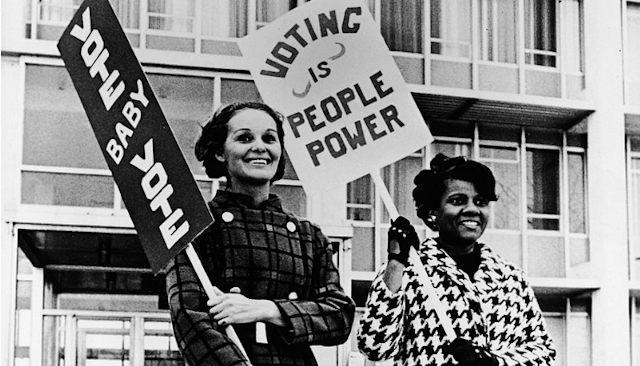Nobody Tells Me How To Vote, Especially My Husband

The room buzzed with conversations about the election. Plastic tables were staggered in the storage room, creating a make-shift phoning center. The voices were a symphony of the issues, like one of those songs you sing in groups, each person starting and ending at a different time. The room smelled of pepperoni and sausage and the grease-stained boxes were stacked in groups, fuel for the volunteers. Amidst the phone conversations were campaign workers trying to outdo each other as they traded stories of interactions with voters. The paper next to my phone outlined the script for my conversation. I had prompts if they asked about health care, education and job creation. But I wasn’t prepared for the responses that, unfortunately, weren’t outliers in my conversations.
“My husband tells me how to vote.”
I thought maybe it would be more difficult for women to say the words to another woman, but still, I received the same nonchalant response more than once.
“My husband tells me how to vote.”
There were no defining features of these women. Their commonality was their alliance to allow their husbands the right to pick their political party affiliation, their candidates, and most shocking, their political issues that mattered most.
Looking back on these encounters, I wish I had stopped and pressed these women about their decision to give up their right to vote. I didn’t understand it. Instead, when the women told me about their decision, I paused, thanked them for their time, and moved on to the next call. My mother always brought me to vote; we openly talked about politics and our own beliefs growing up. I’m raising my own children to know and value the importance of decisions and issues that impact not only our family but also those in our community and world. So it was hard for me to understand how a life-changing decision was handed off to their husbands like it had no value at all.
It is an honor and responsibility earned through death, violence, advocacy, and the bravery of many mothers in our American history. My vote belongs to ME.
When you become tempted to not share your voice on political issues, skip an election, or worse, walk into the voting booth and cast a vote that was dictated by your spouse, remember the women who made sacrifices for you to have your ballot this election day.
We shouldn’t need it, but maybe we should have one of those plastic band bracelets made to say, “What Would Susan B. Anthony Do?”
What she did was lead, with Elizabeth Cady Stanton, the suffragist movement in America and worked to get women the right to vote. Maybe you’ve seen Anthony’s picture on the dollar coin? She was arrested for trying to vote!
Both before and on election day, we must honor our sisters who believed that we as women deserve our own voice, our own political identity, and our own ability to cast our votes for candidates who champion issues that matter to us.
We must not let our husbands, or anyone else for that matter, tell us how to vote.
It is our right and responsibility to pay attention and do research and figure out where we stand on important issues.
It is our right and responsibility to use our voice and have conversations about the election.
It is our right and responsibility to vote.
On election day, we shuffled home from a day of school and work, packed in our car, and headed to the polling place. My husband and I were each handed our own ballots and we stood in our booths, sheltered from each other’s looks, words, and ballot decisions. Our children zig-zagged back and forth between our booths. My daughter’s height had allowed her the ability to see over the platform and see how I was voting. “Dad voted for that one, Mom.”
I looked her in the eye and said, “This is Mommy’s vote. Mommy gets to decide who she votes for today.” (That’s what Susan B. Anthony would do too.)
This article was originally published on